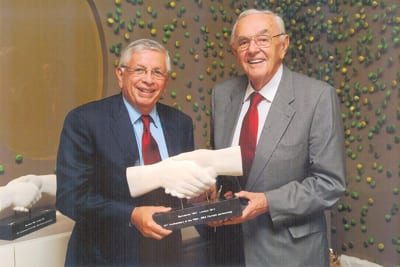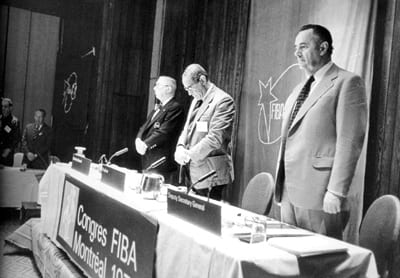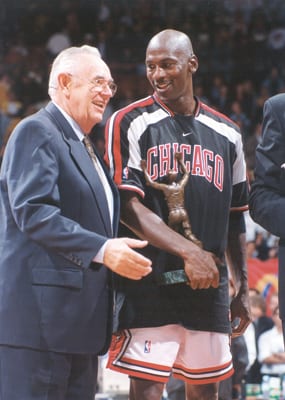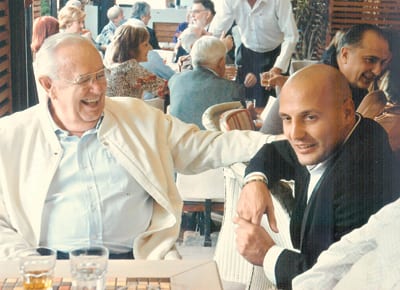The Olympic Games in Rio were, among other things, a testament to the incredible impact that Bora Stanković has left on basketball, as he and the former commissioner of the NBA, David Stern, unified the game a quarter of a century ago
Recently in Geneva, on the occasion of his induction into the FIBA Hall of Fame, former NBA Commissioner Emeritus, David Stern, dedicated half of his speech to the FIBA Secretary General Emeritus Borislav Stanković. Stern, probably the greatest living official in U.S. sports, said that one of the things he was most proud of was that he had helped basketball become ‘a global game’, and that the foundations for this historic project had been laid by Stanković.“
In 1984, when Bora Stanković and I started talking about unifying the NBA with the rest of the world, the U.S. media were very hostile. They said: why do this in the first place when the rest of the world is never going to be as good as the States? However, Bora’s philosophy that only by playing against the best can you one day achieve the best proved to be right. So we had 54 former and current NBA players competing in the 2016 Rio Olympics. If we count the players who have decided to continue their careers in Europe or South America, we get 61 in total. This best illustrates how the world of basketball has changed”, said Stern in Geneva.
The former NBA Commissioner wrote the foreword to Stanković’s autobiography The Game of My Life, which was published by the Serbian Basketball Association earlier this year. In the same book Stanković says that he considers Stern’s words one of the greatest acknowledgements in his career:

“I’ve received great many recognitions all over the world, from America to Senegal to Ivory Coast, but to me perhaps the most valuable of all is what the former President of the International Olympic Committee, Jacques Rogge, the former President of FIBA, Bob Elphinston, and the NBA Commissioner Emeritus, David Stern, have said about me. At my retirement farewell banquet, organised by FIBA in 2002, Jacques Rogge said that “the Olympic movement wouldn’t have been what it is today were it not for people like Stanković”. On the occasion of my induction to the FIBA Hall of Fame in 2007, Bob Elphinston said: “Basketball and FIBA have had three men in their history who are most responsible for basketball as we know it: James Naismith, who invented it, William Jones, the first Secretary General of FIBA, and his successor, Borislav Stanković.” While I was writing this book, I was very touched when I received the foreword from my friend David Stern, who wrote this among other things: “No one has contributed to the globalisation of basketball more than my friend Bora Stanković”. Of course, I’m very pleased to be brought into the two greatest halls of fame. I was enshrined in the Naismith Memorial Basketball Hall of Fame in 1991 when we celebrated two centuries since the birth of basketball, and in the FIBA Hall of Fame when it was founded in 2007.”
He believes that his greatest contribution to basketball and sport in general, is the abolition of Olympic amateurism rules and opening the Olympic movement to all athletes throughout the world
Stanković, now 91, is not as active as he used to be, but he occasionally attends important events in FIBA. In his book ‘The Game of My Life’, he took the opportunity to give a personal account of his life and work (until now this has been done by others) and of many important moments that have become part of basketball and sports history. He believes that his greatest contribution to basketball and sport in general, is the abolition of Olympic amateurism rules and opening the Olympic movement to all athletes throughout the world:
“There were these athletes who were nominally professionals (firefighters, police officers, students), who were getting big scholarships ‒ not to study but to be top athletes. On the other hand, we had proper amateurs. The competitions were unfair because real amateurs and these semi-professionals and professionals worked under completely different conditions. The 1992 Olympic Games in Barcelona were a milestone in the history of our sport. After the Olympics, millions of children all over the world watching all that basketball talent on the court were inspired to bounce the ball on the floor rather than kick it. We saw the direct impact of the Barcelona Olympics on the NBA in the growing number of foreign players in our league. In 1992, there were 26 players outside the States, and today there are more than 100. Many of them are star calibre.”
In his book, he tells us how his father Vasilije, a respected lawyer before World War II, was executed in the last days of the war (December 1944) as ‘an enemy of the people’.

“There were a few people who gave me directions, who were in a sense, my mentors. First, it was my father, but the war snatched him away from my arms too soon. My spiritual father William Jones later took over from him in a way. As for those from Serbia, I’d like to mention Professor Bora Jovanović, Head of the Basketball Department at the Faculty of Sport and Physical Education, Stevan Čolović, the first coach of our national team in a big competition, the 1947 European Championship in Prague. Jovanović was in a way a Serbian version of William Jones: he knew everything about something and something about everything; he was an expert in basketball and a hedonist like Jones. Čolović, on the other hand, was your typical teacher, a sort of a big brother whom I got to know during the war in Belgrade and who taught me about sports and life in general in a different way than Jones and Jovanović did.”
Today, as a basketball war rages between FIBA and Euroleague, few people know that the foundations of the tournament they are fighting for were laid by none other than Bora Stanković ‒ and a few of his associates in FIBA …
“As a Secretary General of the Basketball Association of Yugoslavia, I used to go to the FIBA meetings and to the so-called Standing Conference of European Countries, which was held once a year in the autumn. In one of those, in 1957, it was decided that basketball, following the example of football, should introduce a European championship. The constitution of the committee tasked with organising the tournament, managing it, selecting referees and all the rest, followed a typical William Jones recipe: two men from the Eastern countries, two men from the West, and one neutral. From the East, the two men were Miroslav Kříž, from Czechoslovakia, and Nikolai Semashko, a Russian. From the West: Busnel, from France, and Raimundo Saporta, from Spain. And the neutral one was a Yugoslav – me. Jones was the head of the committee. The first three titles were won by Riga’s ASK, led by the coach Alexander Gomelsky and the first giant of European basketball, Jānis Krūmiņš …”
Today, as a basketball war rages between FIBA and Euroleague, few people know that the foundations of the tournament they are fighting for were laid by none other than Bora Stanković and a few of his associates in FIBA…
Speaking about the secrets of successful leadership, Stanković points out that “being a good leader, being accepted by people, making them follow you ‒ it comes naturally and is impossible to learn”. And he was this in seven languages …
“The first foreign language I learnt was French, in Novi Sad, with a tutor in my first school years. My parents sent me to private lessons – this was ‘in’ at the time among the gentry … The second language was German, just before the war, while I was at grammar school, and the third one was Italian, which I had to learn to work in Oransoda Cantù. I picked up Spanish on my travels ‒ I used to spend a lot of time with Raimundo Saporto. I travelled a lot to South America and brushed up my Spanish there.

I didn’t start learning English until the late 1970s when Jones sent me to the States to mitigate the situation in American basketball. The Slavic languages I don’t count because I’ve always thought that any educated Slav should be able to understand any Slavic language. However, I do count Russian as my seventh language (if I count my mother tongue) … To Jones, I used to speak in French. To Partick Baumann, in Italian and French, depending on how we started. For a while, Italian took centre stage while Aldo Vitale worked at FIBA. To Ursula Frank, I spoke in German, to Robert Bisnelle in French, to David Stern in English, to Juan Antonio and Jacques Rogge, of course, in the Olympic language, French. I spoke Russian rarely: sometimes in the FIBA meetings when some technical stuff that the official translators struggled with needed explaining. On those occasions, I would attempt to translate from Russian to French …”
He influenced basketball by changing the rules of the game too, in collaboration with his best friend, Radomir Šaper:
“I learned a lot during my stay in the USA in the early 1970s when I got the ideas that were later implemented in our rules. The most important one – the three-point line distance. Our rules followed the American ones most of the time. I insisted on the team foul system, on new time rules (not two twenty-minute halves but four eight-minute quarters, and later four ten-minute quarters). We fought against the domination of tall players by introducing the three-second rule and changing the lane. After a three-pointer was introduced in the States, an idea emerged that the rest of the world should adopt the rule. Some wanted the distance to be the same for the NBA, NCAA and FIBA. When we in FIBA adopted the three-pointer at 6.25 m, this was the third line. My critics wanted the distance to be the same as in the NBA, 7.25 m. I was fervently against it. I thought that it was too far, that it would require too high a jump …
At first, the NCAA didn’t want a three-point line at all. They thought that basketball would lose its creativity, combinations, learning the game. Others, however, wanted us to get as close as possible to the NBA, to the spectacle of it, to attract viewers. In the end, as usual, a compromise was found: a little further from the original line, a little closer than in the NBA. I think that with the development of the game the distance will become the same as in the NBA.”
“It’s hard for me to say what I would like to see in the future. Basketball is so widespread; it has achieved its goals and reached its targets and it is difficult to identify a goal today that you would like to achieve in the near future. It was one of the first sports in the Olympics
What attracted him to basketball in the first place (he first saw it and played it during WWII, in 1942) and why he has dedicated his whole life to it, he explains in detail:
“First, it’s a team sport. Team sports have the benefit of sociability and camaraderie that individual sports don’t have. Then, it’s the entire philosophy of the sport and its two main characteristics. The goal is placed horizontally rather than vertically as in other sports (football, handball, water polo, hockey…), which requires a completely different way of achieving that goal. Unlike football, where the goal is often scored by the power of the kick or penetration, here one needs a special placement skill, no strength required. This is why I’ve never been a fan of slam dunks in basketball, which the viewers sadly find so thrilling. Considering that two teams of five players play each other in a relatively confined court, basketball was initially conceived as a game with no physical contact. Since it’s impossible to avoid it, the rules have reduced the body contact to the minimum. It was later incorrectly classified as ‘a noncontact game’, as an antithesis to American football, where there is a lot of body contact. Also, the goal of basketball is placed very high. The height (3.05m) was dictated by circumstances, as this was the height of the gallery in the gym in Springfield, where the inventor of basketball, James Naismith, hung his first peach baskets…”

Stanković emphasises that he has no regrets regarding basketball and that he remembers with nostalgia some events that at the time may have been sad but that are, in retrospect, actually beautiful:
“It’s hard for me to say what I would like to see in the future. Basketball is so widespread; it has achieved its goals and reached its targets, and it is difficult to identify a goal today that you would like to achieve in the near future. It was one of the first sports in the Olympics. The new concept of the World Cup has created great possibilities for the realisation of material benefits. It’s hugely popular: the motto that we once created, to play basketball in every nook and cranny of the world, has been achieved. We have great mutual respect and exceptional collaboration with television and other media. What is yet to be improved is the strength of national federations. It’s a fact that there are 215 federations in FIBA, but we can’t say that all national federations are well organised or that their national tournaments or basketball itself are developed as we would like them to be. Even the Cayman Islands are a FIBA member, and basketball there is not a particularly organised sport.”
In the book, he also reveals that he was named after the author Bora Stanković (1876- 1927):
“My parents had progressive views. Bora Stanković was a famous realist and my parents loved his work very much. Also, the entire literary movement was flourishing when they were young. In fact, they named me after him. Today I can say that I’m an optimistic realist. I try to look at the sunny side of things but when I make decisions, I add a large dose of realism as I assess the reality of great expectations. My guiding principles have been pretty stable throughout my life. My old belief that a once adopted attitude stays for life now seems wrong to me, especially in retrospect. However, it has given me self-respect and certainty in life.
“I think that I’m both modern and conservative. Not everything modern and new brings progress, nor is everything conservative and historically true an obstacle to further development. What bothers me most in a modern man is without a doubt the ‘history begins with me’ attitude … Everything that once was is backward, everything new is modern and progressive. I’ve never been an advocate of such beliefs. This is often characteristic of the young people of today, who have no respect for the past and don’t care about the experience and achievements of the past times.
“I think that I’m both modern and conservative. Not everything that’s modern and new brings progress, nor is everything that’s conservative and historically true an obstacle to further development.”
“I’m neither sensitive nor phlegmatic. When I realise that I’ve been defeated, I accept it as a fact rather than a tragedy. And when my sensitivity takes over, I’m ready for any sacrifice. Over the past years, I’ve had plenty of time for self-searching. What would I change about myself? Only that I may have been too sentimental in my life …”
He has been a true globetrotter too. Rare are the countries he hasn’t visited:
“One of my unfulfilled wishes is to visit Bora Bora. Partly because of its name, partly because of its fantastic beaches that I’ve heard about from other people. Of the places on our planet that I’ve been attracted to but haven’t seen, I’d mention Vietnam, Laos, Cambodia. I haven’t been to that part of East Asia, which was affected by war for so many years. I’ve been to Saudi Arabia twice, in Riyadh, and I’ve visited Bahrain and Qatar. In Europe, I’ve been everywhere but to the Republic of Ireland. In South America, there isn’t a country I haven’t been to. In Central America, I haven’t been to Panama, Honduras, Costa Rica, Jamaica, but I have been to Cuba, Puerto Rico, Guatemala… Africa… I’ve been to all countries in North Africa. As for the rest of the continent I’ve been to Angola, Senegal, Ivory Coast, Kenya, Guinea- Bissau (where I held a training course for coaches in the 1980s). I’ve been to Fiji, Hawaii, the Philipines… but I haven’t been to Seychelles or Indonesia…
“I’ve seen all the big cities in Australia and New Zealand. Of all the beautiful things I’ve seen, I particularly remember the big blue butterflies that I saw at the Iguazu Falls. They just kept flying around me ‒ I’ve never seen anything like it before or since. I’ve been to the Vatican, at the reception by Pope John Paul II as a member of the delegation of the International Association of Athletics Federations, which was then presided by Primo Nebiolo… I’ve flown thousands of times, crossed the Atlantic at least a dozen times. I once travelled around the world too, as part of FIBA’s visits to some countries that invited us. So I started in Munich, flew to Australia, then to Fiji, Hawaii, Los Angeles, Taiwan, and then back to Europe. The city I liked best was Rio De Janeiro.”